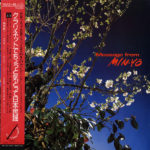
Coming in clear, not just a message from Min’yō but one of other beautiful Japanese folk traditions from the Muromachi period and others from deep sōkyoku compositions, albeit transformed via newfound ideas (of newer ages), as played through by the late great clarinetist Koichi Inamoto. To put it simply: Well, what’s the Message From Min-Yō クラリネットでちょっと気どって日本民謡? It’s another brilliant album of forward-thinking Japanese “folk” that touches on ideas gleaned from other ideas like free jazz, ambient, neoclassical, and even funk and contemporary dance music to create an evolution of the original idea. A brilliant privately pressed album at that, Message From Min-Yō クラリネットでちょっと気どって日本民謡 is Koichi’s wonderful statement to the timelessness of Min-Yō as an art form.
The more I learn about Inamoto-san the more I’m in love with his story. Originally a trumpet player in high school, one day he found a clarinet completely abandoned at school. Unable to find a brass band to play in, he took up this throwaway instrument and saw he could easily pick up and play all sorts of songs he heard on the radio. It just lent itself to his demeanor and playing style, somehow. Unable to find a place to practice, he’d get up early every day, before school even started, and get up on the roof of his school, just wailing away until the neighbors (or janitor) would chase him off. So was his love of this newfound instrumental love.

From then on, he met a unorthodox teacher who promoted his study, taking him under his wing, helping him learn after school through a classically taught method. Koichi would go on to study at Osaka Music University and teach at a middle school in Nagoya. In short time he’d fall in love with a French teacher and followed her to study in Europe, Germany to be exact, further developing his craft. There he was able to actually visit the places where iconic classical compositions were developed. Doing so, spurred him to explore something back home.
If Europe had all this meeting between locale, tradition, and composition, surely his homeland can inspire him too? Going back to the folk songs he heard growing up, Koichi would adapt them to piano or to clarinet, finding new avenues to make them relatable to any background. When he came back home in the mid ‘80s he’d dive deep into the ethnological origins of much of European folk tradition, discovering its roots in Asia. Back home, he made it a goal to do something special with the folk songs he was rediscovering, adapting, and reinterpreting.
In Message From Min-Yō, Koichi is able to go beyond the superficial meeting of East and West. Taking inspiration from sources like jazz, soul, and impressionist composers, the album takes obvious pains to make centuries-old songs baselines for newfound flights of fancy. Unlike most instrumental albums where one instrument’s performance is the highlight, Koichi allows other instruments like synthesizers, electric and acoustic pianos, traditional instruments and newfound instruments (drum machines make quite a splash in this style), to intermingle and transform Min-Yō into something that others might have a wonderful time further exploring.
Message From Min-Yō クラリネットでちょっと気どって日本民謡 is a wonderful work that he privately pressed as a way to escape any genre, or any category, Koichi was afraid a regular company would have forced him to go to. Much like the work of Lyu Hong-Jun, Taiko, Sugai Ken and Riyo Mountains, the album itself takes great pain to advance the eternal experimentation in heritage that could easily be swept to the side by modernity. Although Min-Yō had been little adapted for reed instruments, the “free” style employed Koichi spoke to how much others can still gleam from it.

Min-Yō, old folksong and dance tune grown by the Japanese people. This recording is made to revive and refresh Min-Yō for clarinet solo with piano, Electone or synthesizer. A very special thanks should be given [to] those who helped me making this album. I dedicate this Min-Yō to all mankind with my heart.
Koichi Inamoto, dedication from Message From Min-Yō クラリネットでちょっと気どって日本民謡
